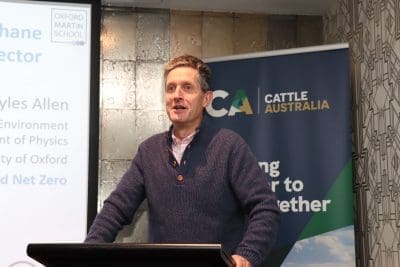“Einstein told us, make everything as simple as possible, but not simpler” – Dr Myles Allen from Oxford University explains the maths behind why he believes methane and carbon dioxide need to be accounted for independently and why climate policy needs to be refocused on ‘warming outcomes’ rather than ’emissions inputs’.
THE globally-used metric for assessing the warming impact of different greenhouse gases is getting it wrong, an Oxford university physicist and IPCC contributing scientist has warned.
“The problem is we have widespread misunderstanding and confusion about how methane influences global climate,” Dr Myles Allen told a gathering of livestock producers, government representatives and media hosted by Cattle Australia in Canberra in late July.
The problem with the most widely-used system for assessing the warming impact of different greenhouse gas emissions, known as GWP100 (Global Warming Potential 100), is that it pretends methane is a kind of Carbon Dioxide (CO2), “and it isn’t”, Dr Allen said.
“We have to address that and in addressing it we have an opportunity,” he said.
“And the opportunity is that if we were to refocus climate policy on warming outcomes rather than emissions inputs, we might actually find it much easier to engage farmers on climate policy.”
It matters that the most widely-used metric is not providing an accurate picture, Dr Allen said, “because we need to know the impact of our actions on global temperature”.
The scientist behind GWP*
Dr Allen is a prominent voice in the global climate science community. He was dubbed ‘the physicist behind Net Zero’ by the BBC.
He is not for the livestock sector or against it, he stressed at the gathering in Canberra, rather he is simply for the science and what the numbers say and where they lead.

Alan Lauder, Carbon Grazing; Dr Myles Allen, Oxford University and Adam Coffey from Cattle Australia.
Dr Allen is perhaps best known to Australian agriculture as the scientist who helped to develop a metric known as GWP* (Global Warming Potential Star).
He emphasised that GWP* is “not new” and builds on and refines the earlier work of others, including a 2012 paper published by Australian carbon grazing founder Alan Lauder and several Australian scientists.
He said GWP* provides a more accurate measure than GWP100 of the warming effect of short-term greenhouse gases like methane.
Where GWP100 gets it wrong
The problem with GWP100 was highlighted in an IPCC assessment report released a few years ago.
While that report has been heavily scrutinised around the world, Dr Allen said “no body is arguing” with this key point contained within:
“Expressing methane emissions as CO2 equivalent using 100-year Global Warming Potential (GWP100) overstates the effect of constant methane emissions on global temperature by a factor of three to four, while understating the effect of any new methane emission source by a factor of four to five, over the 20 years following the introduction of the new source”.
“So these are big errors,” Dr Allen said.
“This is a factor of 300-400 percent.
“This is not some academic quibbling over 20 percent here or there.
“These are big differences in the way the gases behave.”
‘Read past the comma’
Such messages have led some to suggest GWP* effectively allows the cattle industry to relax, take its foot off the pedal and not worry about methane.
Dr Allen warns anyone against coming to that conclusion.
Pointing back to the previously quoted sentence from the IPCC report, he urges the livestock sector to “read past the comma”.
That is the part that says GWP100 ‘understates’ the warming effect of any new source of methane emissions over a 20-year-period (such as a cattle herd increasing in size over that time) by a factor of four to five, or 400-500 percent.
“I think there has been a bit of a tendency for the farming community to stop reading at the comma,” Dr Allen said.
“Obviously the first half of the sentence seems quite positive, good news for you, but you have got to look at the second half as well.”
Stable herds with decreasing emissions negate warming effect
But a key overall message for the livestock sector is this: in a stable herd with emissions gently decreasing over time at a rate of 0.3 percent per year over 20 years – which could be achievable through genetic selection, animal health improvements and emissions-inhibiting feed supplements etc – the warming effect of emissions would be negated.
And if a herd’s emissions can be reduced at a greater rate than 0.3pc per year, it has the same impact on global temperature as actively removing carbon dioxide from the atmosphere, pulling global temperatures down.
“So this is where we have an opportunity,” Dr Allen said.
Carbon dioxide and methane behave ‘totally differently’
Dr Allen says short-lived methane emissions behave “totally differently” in the atmosphere than long-lived carbon dioxide emissions, which remain in the climate system for thousands to tens of thousands of years, accumulating ever faster and leading to accelerated warming.
Conversely, methane has a short lifetime in the climate system, about 10 years.
When methane emissions are rising with the addition of new sources, they will cause global warming.
But if you are reducing methane emissions over time, the warming they cause is reduced.
CO2 emissions, in contrast, continue to drive up global temperatures as long as they remain above zero.
Methane oxidises in the atmosphere, and as the amount of methane in the atmosphere falls, so does the warming it causes.
When emissions are reduced over time, the industry can reverse its warming impact, he said, something that does not apply to CO2 emissions from fossil fuels.
“If we can reduce global methane emissions from the livestock sector we’re doing the same favour to the world as planting trees to taking CO2 out of the atmosphere – we’re pulling down global temperatures,” he said.
Warming effects of different gases should be accounted for independently
Dr Allen said methane and CO2 should be accounted for independently, which GWP* enables.
The world has agreed to reach a temperature goal – that is to hold the increase in average global temperature to well below 2 degrees – yet not a single country actually reports the warming impact of their emissions, he said.
‘Not a single country actually reports the warming impact of their emissions’
Despite the demonstrated limitations of GWP100, the United Nations Framework for Convention on Climate Change annual conference of the parties recently agreed to adopt that metric globally.
This had also caused a misconception that only GWP100 based metrics can be used around the world.
Despite the recent ruling, Dr Allen said UN rules still explicitly allow each country to use metrics other than GWP100.
“We’re supposed to be aiming to stop global warming so countries could report what they’re doing to global warming,” he said.
“We have a massive global convention system which is supposed to be stopping global warming and nobody is reporting the impact of their emissions on global temperature.
“It is staggering if you stop and think about it.”
Farming organisations in NZ and UK call for adoption of GWP*
An umbrella group of developed countries outside the EU, which includes Australia, New Zealand and the UK has recently formed.
Dr Allen said it would be an interesting development for the sake of transparency if those groups started to state the warming impact of their emissions to the UNFCCC, in addition to their national contributions.
 “The warming impact is easy to calculate – the formula involves two multiplications and a subtraction, the old formula involved one multiplication – don’t let anybody tell you it is too complicated,” he said.
“The warming impact is easy to calculate – the formula involves two multiplications and a subtraction, the old formula involved one multiplication – don’t let anybody tell you it is too complicated,” he said.
He also pointed out that farming unions in the UK and NZ have also been calling for their nations to support the adoption of reporting as GWP*.
He said he was not aware of any Australian farming union joining this conversation.
“I think you should, because it matters, we need to know the impact of our actions on global temperature.
“It is something that Australia could really make a positive impact on international negotiations by stepping forward to improve transparency by reporting warming impact as well as the conventional carbon footprint.
“I’m not saying instead of, but I am saying as well as, the conventional carbon footprint.”
Separating methane from carbon dioxide ‘the one thing absolutely everybody agreed on’
Dr Allen said that in a paper involving 35 authors who had published on greenhouse gas accounting metrics in the years since the Paris Agreement was signed, the consensus statement was that “we need separate treatment of methane from carbon dioxide in setting climate targets”.
“And that is the one thing absolutely everybody agreed on.
“If you want to know the impact of your targets and policies on global temperature you have got to keep these things separate, there is no point pretending they’re equivalent.
“So, everybody agreed on that, but it doesn’t seem to so far have made any difference.
“All of the scientists are saying the same thing – separate these things out.
“The likes of the UK Government or European Commission are saying well, no, we like to mix them up.
“So, we have said what we can say. I am not quite sure what more we can say as a scientific community. Now it is kind of going to be over to you to digest all this and talk to your government about what it would take to change things.”
